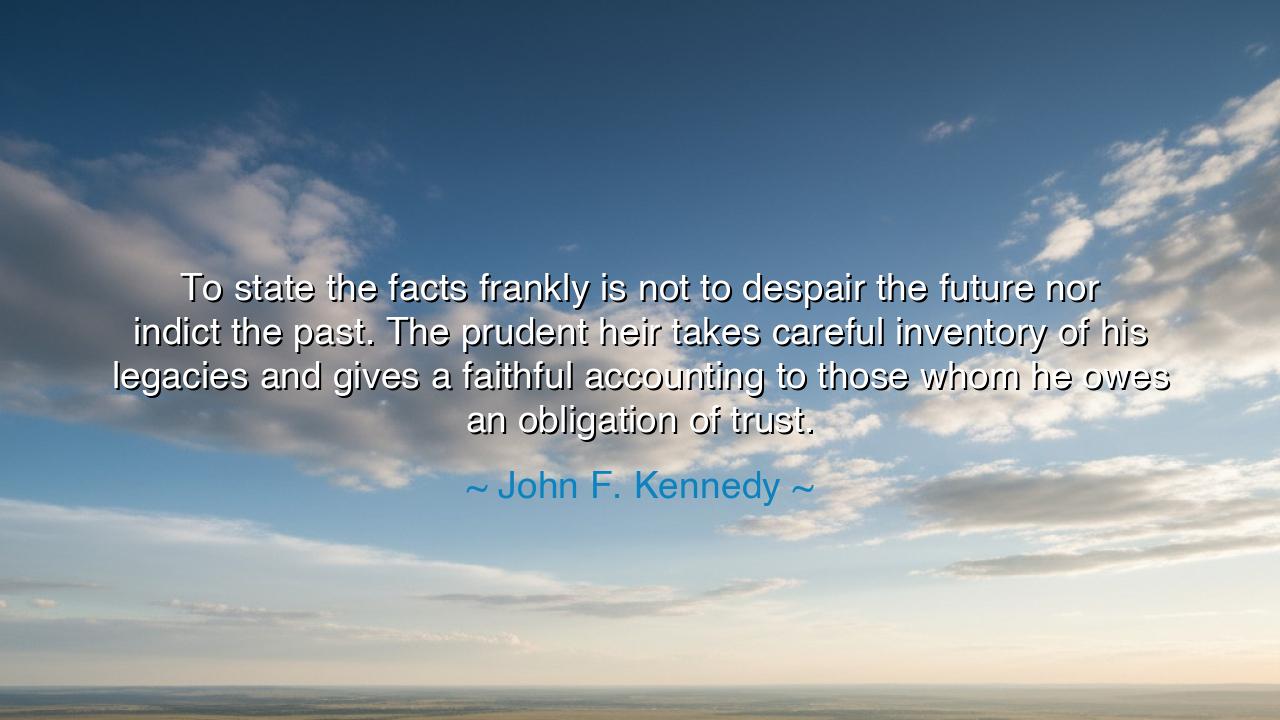
To state the facts frankly is not to despair the future nor
To state the facts frankly is not to despair the future nor indict the past. The prudent heir takes careful inventory of his legacies and gives a faithful accounting to those whom he owes an obligation of trust.






In the great unfolding of time, there are moments when the truth must be spoken plainly, not as an act of despair, but as an acknowledgment of the reality that shapes our present and future. John F. Kennedy understood this when he said, "To state the facts frankly is not to despair the future nor indict the past. The prudent heir takes careful inventory of his legacies and gives a faithful accounting to those whom he owes an obligation of trust." These words ring with the wisdom of those who have always understood the importance of facing the truth, however harsh it may be, without allowing it to diminish the hope for a better tomorrow. Kennedy's call is not for blind optimism nor despair, but for responsibility and accountability—qualities that are vital not only in leadership but in the very essence of human nature.
In the annals of history, the most revered leaders have been those who did not shy away from the truth, but who embraced it with clarity and honesty, knowing that only in doing so could they navigate the troubled waters of their time. The ancient Romans, for example, valued the concept of virtue, which included the honest reflection on both the present and the past. When Cicero spoke of the need for leaders to act with wisdom and integrity, he understood that truth-telling was a fundamental pillar of the moral foundation of society. Similarly, Kennedy's recognition that acknowledging the past and facing the current challenges is not an act of defeat but of strength, aligns with the timeless wisdom that courage does not come from ignorance but from confronting the world with eyes wide open.
Kennedy’s words also carry a message about the legacy we inherit and the responsibilities that come with it. The ancient Greeks taught that we are the sum of those who came before us, and that our actions ripple through time, affecting those who follow. Plato in his dialogues often reflected on the duty of the individual to not only act in their own interest but to serve the greater good. Just as the Athenian statesmen of old were expected to account for the welfare of the state and its citizens, so too does Kennedy remind us that the heir—whether to a throne, a company, or a nation—has a sacred duty to ensure that the legacy they inherit is honored and upheld. To take careful inventory of this legacy is to ensure that it serves the well-being of future generations, not simply as an inheritance of wealth, but as an inheritance of trust and integrity.
There is also a powerful lesson in Kennedy’s statement for those who hold power. History has shown us that those who forget the lessons of the past are doomed to repeat its mistakes. The downfall of the Roman Empire, for example, can be traced to a failure to acknowledge its diminishing strength, a failure to account for the decay that had set in over centuries of excess and negligence. Similarly, in the modern world, nations and individuals who ignore the consequences of their actions or fail to understand the legacies they carry risk leading themselves into ruin. Kennedy’s call to action is a reminder that no individual or society can thrive without facing the truth of their past mistakes and acknowledging the trust placed in them by others.
The prudence Kennedy speaks of is a quality that transcends the moment of decision and is woven into the very fabric of responsible leadership. The heir, whether to a business, a community, or a nation, must not merely inherit the mantle of leadership but must understand the history of what they have inherited and act with careful deliberation. This principle of prudence has echoed throughout time, from the philosophers of ancient Athens to the great statesmen of modern eras. It is the leader who looks not only to their own desires but to the well-being of those they lead, ensuring that the trust placed in them is honored and their actions reflect the needs of the future.
Kennedy’s insight into accountability and legacy carries an even deeper message—one that applies not only to nations but to individuals. Each of us, in our own way, is an heir to the legacies of those who came before us, whether it is our families, our communities, or our societies. We, too, must take inventory of our legacies, examining the choices we make and the values we pass on. In a world where the pursuit of wealth and status often distracts from the greater good, the true measure of a person is not found in what they acquire, but in how they use their resources and their privilege to serve others.
Thus, Kennedy’s words call us to a higher standard—one of honesty, accountability, and duty. The legacy we inherit is not simply ours to consume, but ours to care for, nurture, and pass on. In doing so, we must be faithful to the trust placed in us, whether by our families, our communities, or the larger world. The future we leave for the generations to come is not just a result of the decisions we make today, but of how we honor the past and take responsibility for the legacies we inherit. This is the call to action that echoes through time and that Kennedy so wisely reminds us of: to be prudent, to be accountable, and to ensure that the future we shape is one that is worthy of those who follow.






AAdministratorAdministrator
Welcome, honored guests. Please leave a comment, we will respond soon